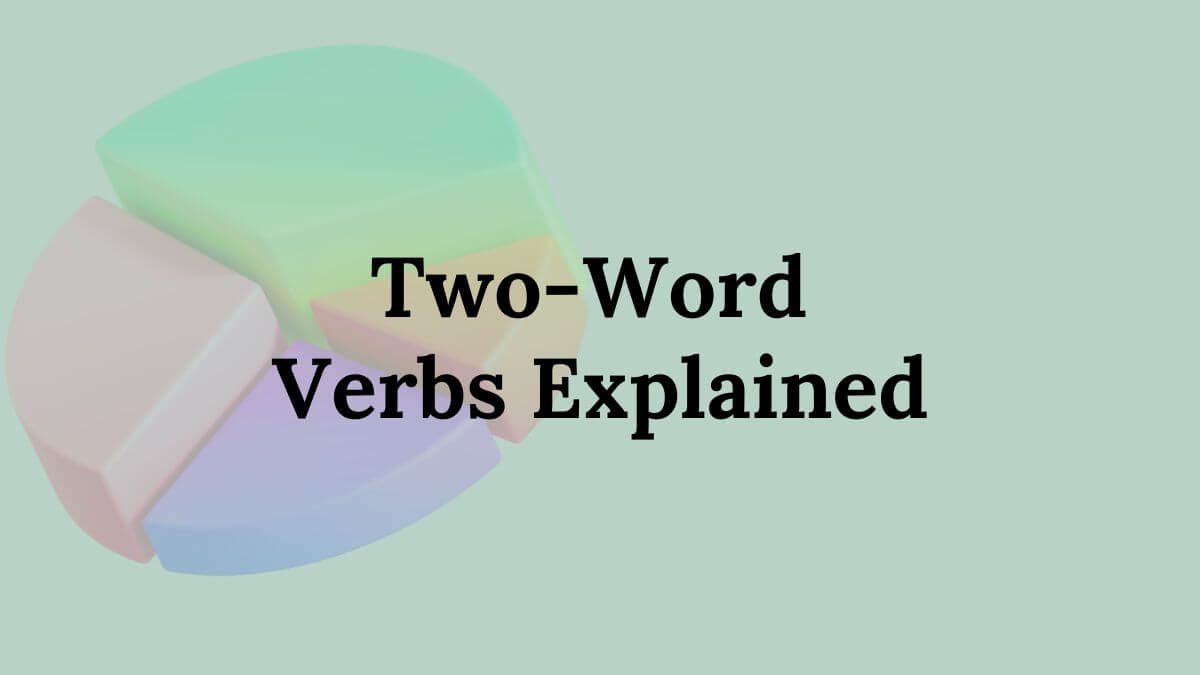Understanding two-word verbs is essential for mastering English. These verbs, often called phrasal verbs, combine a main verb with a particle to form unique meanings. Learning them improves both writing and speaking.
In this article, you will explore common two-word verbs, their types, idiomatic usage, and practical examples. With clear explanations and examples, these verbs will become easier to recognise and use correctly.
TWO-WORD (PHRASAL) VERBS
Two-word verbs, also called phrasal verbs, are verbs combined with a preposition or an adverb to create a new meaning. Unlike regular verbs, the particle is an essential part of the verb and often changes its meaning completely.
For example, “run” changes meaning when paired with different particles: run into means to meet unexpectedly, while run out means to use something completely.
These verbs are very common in everyday English, especially in conversations and informal writing. Many are idiomatic, so their meanings are not always obvious from the individual words. For instance, blow up means to explode, and look up means to search for information.
What Are Two-Word Verbs?
A two-word verb is a verb combined with a preposition or adverb that changes the meaning of the original verb. These are often informal and idiomatic.
Examples:
- hand in → submit
- break up → end a relationship
- run into → meet unexpectedly
Some phrasal verbs even use three words:
- come up with → invent or think of
- check up on → investigate
Why Two-Word Verbs are Important?
Two-word verbs are widely used in everyday English, especially in conversations. They often make speech more natural and fluent. Understanding these verbs helps learners communicate ideas more clearly and sound less formal.
Example:
- Formal: Please submit your homework.
- Informal: Please hand in your homework.
Structure of Two-Word Verbs
Two-word verbs can appear in three common forms:
- Verb + Preposition – look into, rely on
- Verb + Adverb – get away, calm down
- Verb + Adverb + Preposition – get away from, put up with
These structures determine how the verb interacts with objects in sentences.
Characteristics of Two-Word Verbs
Informal Nature
Most two-word verbs are informal and commonly used in everyday speech. While acceptable in academic writing, some may contain unnecessary “filler” words:
- keep on going = keep going
- fell off of = fell off
Example Substitutions:
| Phrasal Verb | Alternative Verb |
| Hand in | Submit |
| Check out | Examine/Borrow |
| Look up to | Admire |
Idiomatic Usage
Many two-word verbs are idiomatic, meaning their meaning cannot be guessed by looking at the individual words.
- blow up = explode
- call up (US) = phone
- ring up (UK) = phone
Regional variations often exist, so context and location matter.
Sensible but Figurative
Although idiomatic, some two-word verbs make logical sense through figurative meaning. The particle (preposition or adverb) often determines the sense of the verb.
- blow up → sudden explosion or figurative escalation
- break down → stop functioning
- break up → end of a relationship
Understanding the particle’s metaphorical meaning helps learners grasp the verb’s intention.
Common Two-Word Verbs and Examples
Here are some widely used two-word verbs with meanings and example sentences:
| Two-Word Verb | Meaning | Example Sentence |
| Hand in | Submit | Please hand in your assignment today. |
| Break up | End a relationship | They decided to break up last week. |
| Fill out | Complete a form | Can you fill out this form, please? |
| Run into | Meet unexpectedly | I ran into my teacher at the mall. |
| Look up | Search information | I need to look up the word in the dictionary. |
| Get away | Escape | The thief managed to get away. |
| Come up with | Invent or think of | She came up with a great idea for the project. |
| Check out | Examine or borrow | You should check out this new book. |
| Put off | Delay | We had to put off the meeting. |
| Keep on | Continue | He kept on talking despite the noise. |
Tips for Learning Two-Word Verbs
- Learn in Context: Understand how the verb works in a sentence.
- Use Flashcards: Write the verb, meaning, and example for memory retention.
- Practice in Conversation: Speak and write using two-word verbs daily.
- Group by Particle: Learn verbs sharing the same particle together, e.g., break up, break down, break out.
Summary
In conclusion, two-word verbs are an essential part of English grammar. They combine a main verb with a particle to create new, often idiomatic meanings. By understanding their structure, idiomatic usage, and figurative sense, learners can enhance both writing and speaking.
Remember, while two-word verbs may seem tricky at first, consistent practice and exposure will make them second nature. Start using them in sentences today and notice how naturally your English improves!
